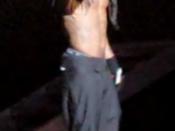Music videos for hip-hop songs often represent women as strippers and sex objects. Artists do this usually to appeal to a young male audience and create a certain image or representation of the artist and also of the women in their lives. This report will talk about the representation of women in the videos "Love Me" by Lil Wayne, "King Tut" by Busta Rhymes and "Candy Shop" by 50cent and attempt to show how videos similar to these represent women in a particular way in the hip-hop genre. The music video "Love Me" by Lil Wayne is one example of women being represented as strippers or sex objects, which is a fairly common stereotype in hip-hop music videos. At the start of this video, close-ups of female faces are shown; wearing heavy make-up, no visible clothing and posing seductively at the camera. One of these women has a muzzle-like object over her face, suggesting she needs to be contained, like an animal.
There are also shots of Lil Wayne and Drake, but in these they are fully clothed, laughing and singing. The contrast between them being fully clothed and the women wearing almost nothing shows that the women are likely there to "entertain" in the way a stripper would. Women are then shown wearing nothing but lingerie, heavy make-up and are on swings. They swing in the way a stripper would on a pole. These are things that do not show the women's personality traits and show they are there purely to please the males in the video or in the audience. Later on in the video, the women are shown in a shallow pool crawling towards a bed in the middle that Lil Wayne is sitting on. They are also wearing bikinis and swimsuits that reveal...


